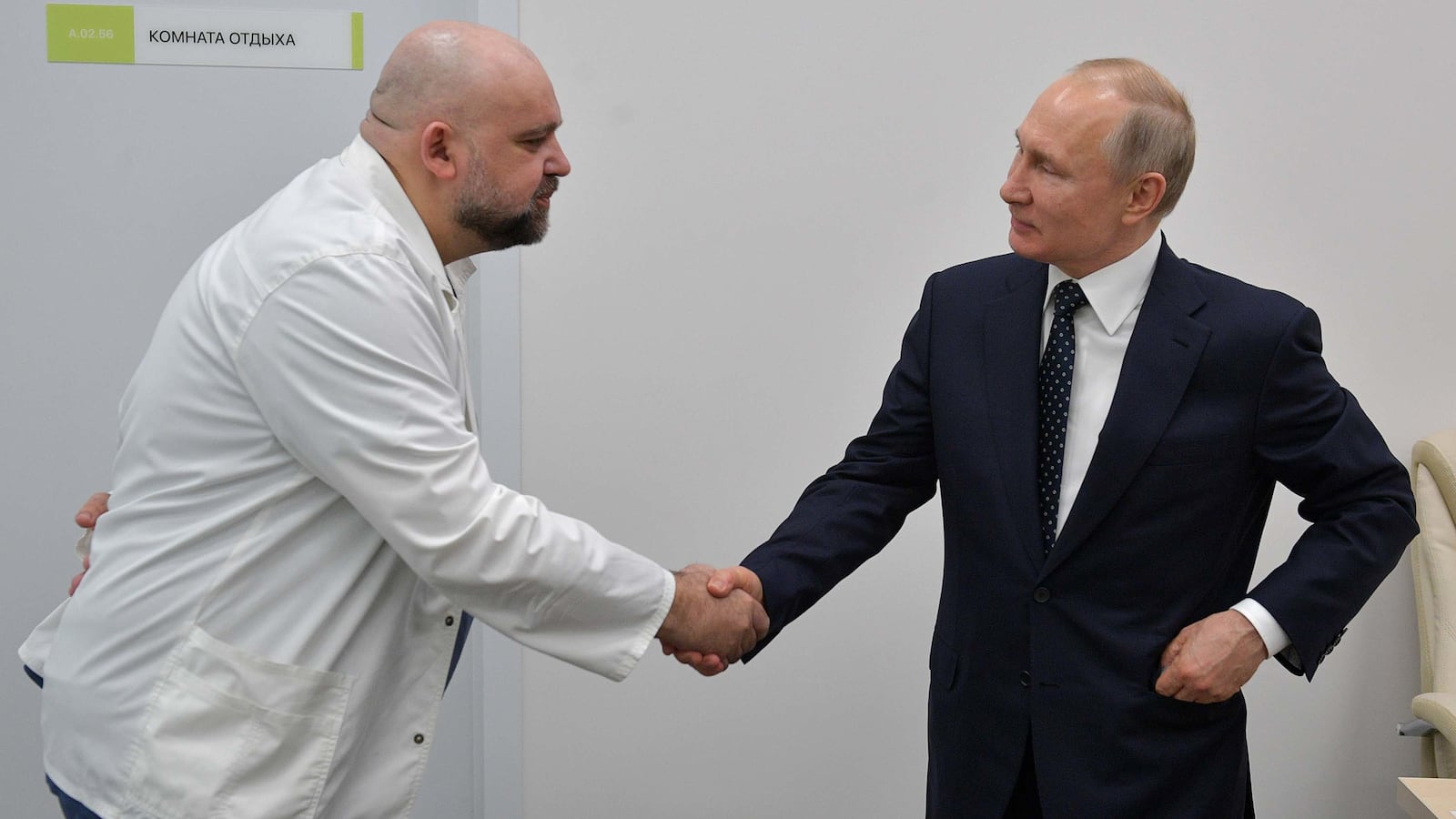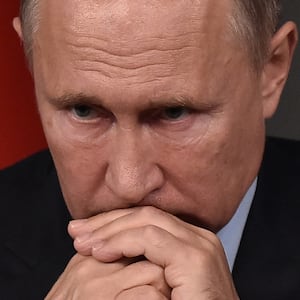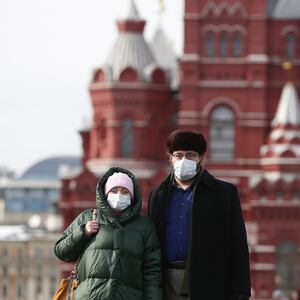MOSCOW—Amid a growing uproar in newly locked-down Russia, news broke on Tuesday that a doctor President Vladimir Putin met with just a week ago during a highly publicized visit to a coronavirus treatment facility has now tested positive for the infection himself.
Widely disseminated photos of the visit showed Putin donning an orange hazmat suit, but he had also talked to Dr. Denis Protsenko extensively without protection and photographs show them together with very little "social distancing."
Putin's spokesman says the Russian president is tested frequently for coronavirus infection and is just fine. But the news is bound to shake a country already racked by uncertainty, fear, and not a little anger.
“You should find abandoned cells used to punish prisoners, cold ones with no food in them, lock them up there,” Chechen strongman Ramzan Kadyrov declared as the Russian Federation went into a nationwide lockdown over the weekend. He was telling his security force commanders how to treat those who disobeyed the curfew and quarantine orders. “Throw them in a big hole, bury them, let them die in it."
Most Russian officials are not as blunt and brutal as Kadyrov, a Putin protégé and the point man for some of the more ruthless actions carried out in support of the president. But the coronavirus crisis has brought to the fore the grim authoritarian instincts of several leaders in what was once the Soviet Bloc.
As their people try to find masks and rubber gloves to protect themselves, dictators are raising their iron fists, not least, to protect their regimes. Others are still trying to pretend there's no problem at the moment. The crackdowns will come later.
One of the most stunning moves was taken in Hungary, a member of the European Union, where the parliament passed a bill giving Prime Minister Viktor Orbán—one of Putin’s closest EU soulmates—virtually unlimited powers to rule by decree; suspending parliament; canceling elections; threatening up to five years in prison for those who spread “fake new” and rumors (read, criticism of the regime); and up to eight years in prison for those who break the quarantine. All this for as long as Orbán wants.
“And there it is,” tweeted historian and columnist Anne Applebaum, “The European Union's first dictatorship. None of these powers is needed to fight the virus. But they will help distract and deter opposition, especially when it becomes clear that the government has no better plan.”
Here in the Russian capital the picture is more mixed, because Putin himself has sent messages to the public almost as confusing and contradictory as those of President Donald J. Trump in the United States.
For weeks and months, as thousands began dying from the disease in China—then Italy, France, Spain, around the world and now with a vengeance in the United States—many epidemiologists warned COVID-19 will kill millions if drastic measures are not taken to stop it. But Russia delayed the actions needed to prevent the worst outbreak scenarios.
It was obvious, as we reported, that President Vladimir Putin and his supporters did not want anything to interfere with a planned April 22 referendum to ratify his continued rule for at least another 16 years. It was also apparent that Russia did not want to let anything interfere with its May 9 Victory Day celebrations marking 75 years since the defeat of the Nazis. So the official number of infections in this country that borders the Chinese and European epicenters of the spreading plague remained implausibly low.
Last week, the numbers caught up with the Kremlin, as cases became too numerous to deny, and Moscow Mayor Sergey Sobyanin said flatly the infection rate was much higher than the government was admitting. The number of officially diagnosed Muscovites now exceeds 1,000, with at least nine people killed by the virus.
On Tuesday last week, Russia’s Channel One announced: “Our president is on the front lines of the main war on the planet, the war with coronavirus.”
Over the last two decades, Russians have seen Putin as a self-styled man of action mobilizing resources to make Russia stronger, richer, greater. TV channels showed the commander-in-chief in the cockpit of a fighter jet wearing a pilot’s uniform. His shirtless shots became iconic. He even appeared to guide migrant birds as he flew an ultra-light aircraft. And now the country watched Putin in a bright yellow hazmat suit touring Moscow’s new coronavirus hospital, although it appears he did not actually meet any coronavirus patients.
Putin was giving the public its cue, once again, to follow the leader. And he did meet with the hospital’s chief physician, Dr. Denis Protsenko, whose positive test for coronavirus was just announced this Tuesday.
Protsenko, 44, sounded straightforward when he spoke to the BBC last week. He said he was convinced that Russia should be ready for the “Italian scenario,” and that he personally was prepared to put diapers on and work 12 hours a day in intensive care units, like Chinese doctors did at the peak of the epidemic. “I personally would put Moscow on quarantine,” he declared, adding with tact worthy of Trump advisor Dr. Anthony Fauci, “The question is about the price for closing down.”
But in Putin’s address to the nation the next day, he did not use the word “quarantine” at all. To the relief of many, he announced that nobody would have to go to work until April 5, but they would be paid, and nobody would have to go to the polls to vote for constitutional changes on April 22. The referendum would be postponed.
“If Putin made Russians go to polling stations next month, that would threaten thousands of lives; he is careful choosing his words now, he tries to secure his reputation,” Ilya Yashin, a Moscow municipal deputy, told The Daily Beast.
After coronavirus cases tripled in many Russian regions on Thursday, Putin ordered most public places closed, including city parks.
“If Russia’s epidemics develop like the Italian scenario, which is quite possible, there will be no way for him to secure his reputation—the entire responsibility will be on the government,” said Yashin.
If that happens, one can expect even Putin himself to show the iron fist. But for the moment in the nation’s capital that has not yet hammered down. And many Russians, a famously fatalistic people, appear unimpressed with the twin threats of tyranny and pandemic.
On Sunday, most of the Russian capital’s downtown was still open, and public transport as well. Bars were closed, but young people continued to hang out in hidden corners. Skateboarders focused on their kickflips, as if no epidemic mattered. A group of hipsters outside a still-open bookstore listened to a girl read aloud, her face pink in the light of sunset. The poem was one of Joseph Brodsky’s: “They loved to sit together on a hillside...”
Then on Sunday night, Russia slammed its doors a little harder, in a pattern now familiar to countries around the world: governments first try to persuade, and when that fails, as it usually does, they try to enforce the quarantines and distancing. A few hours before midnight Sunday night, authorities finally announced a complete lockdown for the capital and its 11 million residents.
Police cars with loudspeakers began to order pedestrians to hurry back home: everyone in the city now had to stay in their apartments, leaving only for the closest grocery or drug store, or to walk a dog no more than 100 meters from home—the kinds of restrictions imposed in much of Western Europe for weeks now, and in Italy for more than a month. Moscow was joining the club of almost three billion self-isolating people around the globe. Moscow Mayor Sobyanin declared that the epidemic was entering “a new phase.”
Yet, as of Monday, authorities reported every fifth Muscovite violated the new regime.
Even pro-Kremlin Russian experts said the measures came too late—with all the terrifying examples in the West to prove the point. “It was great we closed down Russia’s border with China in January, but Moscow should have given people a week off from work earlier this month, and authorities should have banned all travel by trains and airplanes from Moscow to other regions,” pro-Kremlin political analyst Sergei Markov told The Daily Beast on Monday morning. “That would have protected more than 55 regions, which are now also infected.”
By Monday afternoon, 71 out of 85 Russian regions had reported coronavirus cases—the epidemic is spreading around the world’s largest country like windblown fire through dry grass, affecting its poorest and most vulnerable people even in remote corners of the federation.
An infected resident who apparently contracted the disease on a trip to Cuba brought it to the remote town of Apatity, about 1,000 miles north of Moscow, in the Murmansk region. By the weekend, according to television reports, dozens of people in Apatity and nearby Kurskiy were checking into hospitals with coronavirus symptoms, so authorities had to shut down both towns for self-isolation on Monday.
The sale of alcohol, wine as well as vodka, has jumped by at least 20 percent compared to March 2019.
As for protection from the virus, there was none available. As happened in so many other countries, every pharmacy in town was out of masks and hand sanitizer.
Yet many Russians found a kind of perverse courage by comparing what seemed the hypothetical threat of the virus with all too substantive difficulties and dangers of everyday life.
A video clip of a song steeped in slavic fatalism mocked the pandemic. Russia is used to nightmares, it proclaimed: “First, our blood is full of alcohol, the whole of life is folded into a black hole; Authorities hypnotize us and sell us out, but we have no infected fellas in our favelas.” Why be worried about COVID-19 if you risk being eaten by a bear or getting killed by a policeman, the authors say. “We lost all our ability to be afraid,” the song concluded: “We don’t give a shit.”
The polls reflect that sort of attitude. According to social research by Romir Holding, 54 percent of Russians do not believe in the danger of the COVID-19 pandemic. And, even now, the only man Russians listen to, commander of the coronavirus war Vladimir Putin, still has not given clear instructions about the deadly outbreak, or how to avoid getting infected.
Nobody clearly predicted the scale of the epidemic’s storm coming to Russia, nobody talked about the exponential growth of the outbreak in the United States and Europe except to crow as if Russia somehow were exempt.
In announcing the week off, Putin did ask Russians not to rely on traditional “avos,” the typical carelessness and fatalism traditional in the nation’s approach to the dark promise of the future, but the message seems to have been taken with, well, fatalism and carelessness.
Moscow is still in the early stages of the inevitable nightmare, when confusion and defiance mingle with fear. So hairdressers are still working, and without masks. Women are going to them without taking the slightest precautions. This, even as thousands of people who suspect they’ve been infected are calling a coronavirus hotline.
Earlier this week Yulia Galyamina, a Moscow politician and scientist lost her sense of smell, developed a fever, and felt weak. Those are all signs of infection. But as in other countries, she found it impossible to get a test unless she could prove she was at death’s door. She called a doctor and the agency supervising tests, but they said they could do nothing for her. “A district [government] doctor said since I was not terribly sick, I could not get tested,” Galyamina told The Daily Beast. “Private labs ask you not to show up if you have had symptoms in the past week.”
On Saturday, authorities admitted that 166,000 Russians are on a coronavirus watch list—not confirmed with infection, but suspected of having the contagion or of being at risk. That’s a worrisome number. It suggests the observable cases are vastly higher than those confirmed, and again raises the question of why no clear determination had been made about many of them weeks ago.
“Moscow Mayor Sobyanin had guts to tell Putin right into his face on Tuesday that the real situation is much worse than the official reports say,” Vladimir Ryzhkov, professor at the Higher School of Economics, told The Daily Beast.
Earlier this month, Putin said that the situation with coronavirus was “under control.” Authorities told Russians not to spread fake news about the pandemic threat.
When there were still just a few cases of COVID-19 in Russia, Anastasia Kirilenko, The Insider’s investigative reporter, heard tragic news from Novosibirsk: her 34-year-old cousin died of pneumonia.
The Russian health system is in miserable shape in the regions, dozens of district clinics closed in rural remote towns all across the country in the past few years.
“Regional paramedics diagnosed my cousin, a young and healthy man, with acute respiratory viral infection but did not do an x-ray to check why he had a high temperature during the last month of his life,” Kirilenko told The Daily Beast. “Now we wonder if my cousin had coronavirus just like thousands of other Russians who are said to have only pneumonia.”
Christopher Dickey also contributed to this article.








